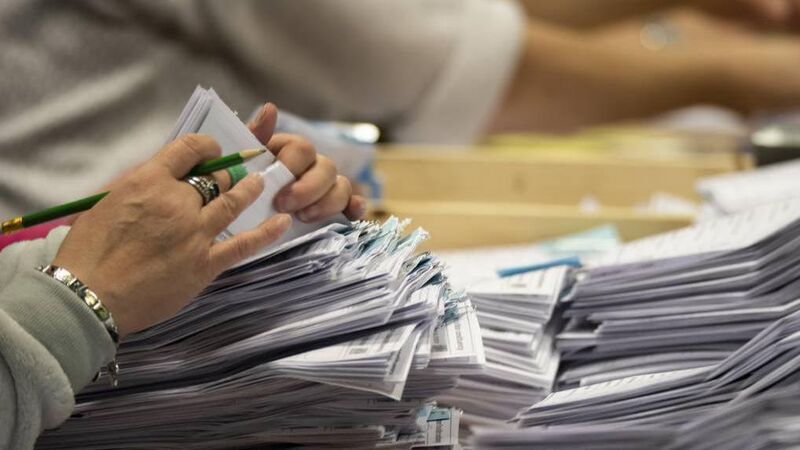What’s the point of voting, if we can’t hand politicians power?

It’s a smugness that tends to be restricted to the political anoraks, and doesn’t extend out to the vast majority of the population.
It’s an argument that proclaims that Ireland’s Proportional Representation (PR) voting system is the best and fairest of then all, and that the elections elsewhere, particularly in the UK and USA, are just not up to the job.
Well, in recent weeks, it has been interesting to put this theory to the test. Ireland held local and European elections last month, France and the UK staged national elections in recent weeks, and the U.S election cycle continues to grind inexorably to the November finale.
Many in Ireland would be preening in the mirror at this point, expecting to see their own reflection. But do the resulting scenarios reflect this. Not in my view. Not at all.
Firstly, let’s accept the fact that elections are there to:
a) Allow the people to exercise and partake in democracy.
b) Elect a group of people who will steer the ship of state for all those who voted, and who didn’t.
I believe we get so hung up on a) in this country, that it gets in the way of us putting b) into action.
Look at the European elections in Ireland. It took the bones of a week to discover who would be representing us in Brussels, as our convoluted system of counting played out in agonising slow motion.
The anoraks marvelled at its complexity, but I’m sure the bulk of the electorate - only half of whom voted anyway - disengaged.
Within 24 hours of voting, Germans knew their MEPs and had digested the fact the far-right had made in-roads into seats. To proffer a tasteless joke, the country could have invaded Poland while our bean-counters were still thrilling at the ninth count, never mind putting their boots on.
To make a more serious point, MEPs across Europe were already talking about coalitions and horse-trading in the EU Parliament days before Ireland had completed its endless round of counts.
And all to make voting in Ireland fairer? In what way?
We are told that this ensures a fairer reflection of people’s views, and allows smaller parties and independents to be represented, but do I have to tap the sign for b) here? Too often, our MEPs and TDs have no chance of getting anything done due to the shallow power base, and the myriad voices pulling policies left, right, and centre.
It leads to a weird system where a so-called centre-right governing party in Fine Gael can shift from an ‘Open all the borders’ approach to immigration, to a ‘Send them back‘ one in the space of a few months.
And don’t get me started on the political groupings in Brussels - that’s already a mess in need of reform no matter what form of voting is carried out. Suffice to say that two Irish independents ended up joining a Brussels political group to which Fianna Fáil belongs - I wonder how many of the people who voted for them wanted that to happen?!
It’s in the Dáil, where the word soup coalitions usually rule, where our voting system really gets exposed. Each coalition is gripped by paralysis as compromise is the order of the day. It means all candidates can promise the earth, then blame coalitions for tying their hands.
Contrast our elections to the speed of the UK one. One person, one vote, results in hours, and the entire new parliament decided by breakfast. Rishi Sunak exits Downing Street, Keir Starmer moves in, and begins the job of governing, unhindered by other parties demanding he waters down this or compromises on that.
Yes, it’s absolute power, but only for a maximum five years. Why are we in Ireland so afraid of this prospect?
Starmer has been dynamic and hit the group running, aware that the clock is already ticking on his time in charge, and that the people want to see swift progress.
Contrast that with our last general election, where it took FOUR MONTHS for a draft programme for government to be drawn up that was acceptable to all coalition groupings. Not long after, the Dáil broke for its summer recess! Sure, why not.
It’s a wonder anything gets done up there in Dublin. And even then, the party that got most first votes in 2020 didn’t get a sniff of power!
But, but... proportional representation is the bees’ knees, apparently.
I say, never mind the process, feel the quality of its results.
At least Ireland can take some comfort from the shenanigans in France, where, for some reason, they hold a round of voting, then another one, presumably for those who weren’t paying attention first time round at the back of the class.
Both elections threw up extreme, contrasting results, and god knows what happens there next, but I’m pretty sure rioting and protests are on the agenda at some point. That’s what happens when the people ‘in charge’ leave a vacuum.
(Then again, if you think two rounds of voting in an election is odd, remember that we have done the same here when a referendum result went, er, the ‘wrong’ way).
At least, in the U.S, we all know there will be one man left standing after their November election, and voters will know the result in hours. The calibre of that leader of the western world may be far from ideal, but it doesn’t mean the process is at fault.
Is the reason we dislike the UK and U.S election systems so much because they are so, well, definitive? Because they ruthlessly eliminate the losers - to use a favourite Donald Trump term - and hand all power to the winners, albeit for a four or five year term? Are we afraid of putting all that power in the hands of one person or one party?
Moreover, the people who voted a person or party into power to advocate policies for them, often find that those policies are not implemented because of some lame halfway house cross-party agreement.
This will be a controversial view - but our messy election landscape ensures that, no matter who we vote for, Official Ireland - the NGOs, the civil services, the People Who Know Best - always end up running the country anyway, diluting new or different policies that might frighten the horses, or sidelining them.
Here’s an interesting point: Did you hear that fundamentally decent and humble speech former UK Prime Minister Rishi Sunak gave after he lost the election? When was the last time the will of the people forced any politician here to believe they had ‘lost’ the people’s confidence?
Proportional Representation is not conducive to that type of finality, but perhaps we need that, in order to keep the cycle of ideas flowing.
Put it this way: If I were a politician, I would be in favour of PR, because it provides so many ‘winners’ and so few ‘losers’.
But if I were in favour of a better-run country and a healthier political landscape, I wouldn’t favour it at all.







 App?
App?




